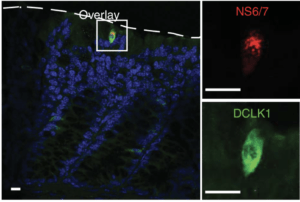
MNoV nonstructural protein NS6/7 colocalizes with DCLK1 in the colone
of WT mice infected with MNoVCR6 at 7 days postinfection. NS6/7 expression is punctate and cytoplasmic, consistent with the viral replication complex
Norovirus is a highly infectious virus responsible for approximately 700 million cases and 200,000 deaths due to acute viral gastroenteritis annually. Norovirus tropism in humans, particularly the immune cells that mediate transmission remains poorly understood. Recently researchers demonstrated using a murine norovirus model (MNoV) that a small population of epithelial cells are the reservoir for chronic norovirus infection. Wilen et al., aimed to further characterise this cell population in vivo.
CD300lf is the protein receptor for MNoV, and mice deficient in CD300lf are resistant to MNoV infection. A study by Wilen et al., showed that CD300lf (norovirus receptor) expressing epithelial cells and not myeloid cells facilitated norovirus infection. This result was achieved by demonstrating that wild type mice that received bone marrow (myeloid progenitor cells) from CD300lf deficient mice were susceptible in norovirus infection. These CD300lf expressing epithelial cells co-expressed doublecortin-like-kinase 1 and cytokeratin 18, tuft cell markers, illustrating that tuft cells are the target cell for MNoV.
Tuft cells are the primary source of interleukin-25, a cytokine that initiate a type 2 immune response against parasites. Thus, researchers hypothesised a relationship between that type 2 immunity and norovirus infection. Wilen et al., showed that treatment of mice with IL-2 or IL-25 resulted in enhancement of MNoV infection compared to controls. Additionally, IL-4 treatment resulted in a significant increase in norovirus shedding, a function independent of T cells, B cells and IFN-λ induced innate immune signaling.
In summary, this research identified tuft cells as the target for MNoV. An important discovery that has implications in the understanding of persistent intestinal infection because norovirus has been observed to cause inflammatory bowel syndrome in genetically susceptible hosts.
Journal Article: Wilen et al., 2018. Tropism for tuft cells determines immune promotion of norovirus pathogenesis. Science
Article by Cheleka AM Mpande











